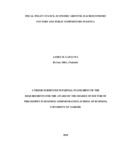| dc.description.abstract | There has been growing concerns on the level of public expenditure or government spending yet there are limited public resources available to attain various social and economic needs of citizens in a nation. Hence, governments should be more prudent in public spending regardless of whether an economy is contracting or expanding. The goal of this study was to examine the relationship among fiscal policy stance, economic growth, macroeconomic factors and public expenditure in Kenya. Therefore the specific objectives of the study were to: Examine the effect of fiscal policy stance on public expenditure in Kenya, establish the influence of economic growth on the relationship between fiscal policy stance and public expenditure in Kenya, establish the influence of macroeconomic factors on the relationship between fiscal policy stance and public expenditure in Kenya and finally examine the joint effect of fiscal policy stance, economic growth, macroeconomic factors and public expenditure in Kenya. Four hypotheses were formulated and tested to achieve the study objectives. The study was anchored on Fiscal policy theory, Wagner’s Law, Peacock-Wiseman hypothesis, Pure theory of public expenditure and Marxist theory of business cycles. The study adopted a positivist research philosophy and structured as a longitudinal study using a causal research design focussing on Kenya over the study period from 1964 to 2015. The main study findings were as follows: First, there is a weak relationship between fiscal policy stance and public expenditure. Second, economic growth has an intervening influence on the relationship between fiscal policy stance and public expenditure. Third, macroeconomic factors have an intervening influence on the relationship between fiscal policy stance and public expenditure and lastly fiscal policy stance (budget deficit), foreign aid & grants and the lagged public expenditure have a statistically significant effect on public expenditure. The findings of the study support Wagner’s Law. The conclusions of the study are that fiscal policy is not a strong policy tool that can be used by the government to directly determine the level of public expenditure. However, fiscal policy stance indirectly affects the level of public expenditure through economic growth and macroeconomic factors. Furthermore, economic growth and macroeconomic factors have an intervening influence on the relationship between fiscal policy stance and public expenditure. The study contribution to knowledge is providing evidence on the relationship between fiscal policy stance and public expenditure in Kenya considering that there is limited empirical evidence in the finance literature. Also the study proves that economic growth and macroeconomic factors have an intervening effect on the relationship between fiscal policy stance and public expenditure in Kenya. The recommendations for further research are that a qualitative approach can be adopted in determining the effects on public expenditure and a cross-country study approach can be undertaken in examining the interrelationships amongst the variables. | en_US |



